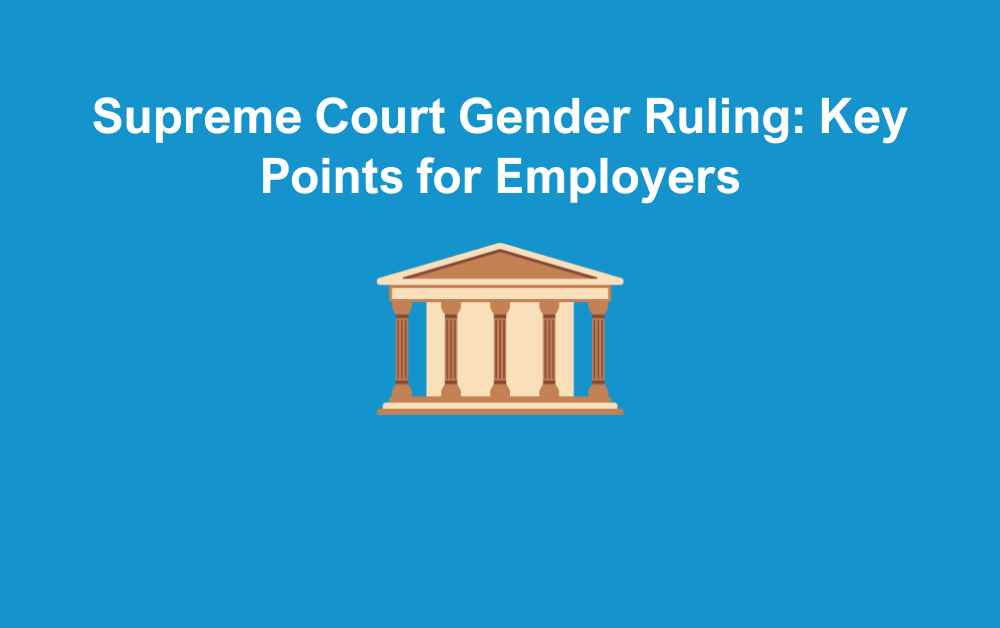The Supreme Court Gender Ruling
As part of the ruling, the Supreme Court made a decision on how the 2010 Equality Act should be interpreted. Lord Hodge described this as relating to how the terms ‘woman’ and ‘sex’ are defined in the context of the legislation.
The Court ruled that the Equality Act clearly separates the legal definitions of sex and gender reassignment, and both must be treated as different protected characteristics. It explained that transgender people are protected under the gender reassignment category. However, this is not the same as the protections based on being biologically male or female. The Court also made it clear that getting a Gender Recognition Certificate does not change a person’s sex when it comes to how the Equality Act applies.
When it comes to the workplace, this impacts on how sex-based rights and rules are applied. This includes certain benefits, occupational requirements, and access to single-sex spaces. The law says these must be based on biological sex. At the same time, transgender employees are protected from discrimination under gender reassignment provisions, and their needs must also be considered.
Lord Hodge said:
“It is not the role of the court to adjudicate on the arguments in the public domain on the meaning of gender or sex, nor is it to define the meaning of the word ‘women’ other than when it is used in the provisions of the EA 2010,”
“The unanimous decision of this court is that the terms woman and sex in the Equality Act 2010 refer to a biological woman and biological sex.”
Supporting Transgender Employees
The ruling may clarify the legal interpretation under the Equality Act, it also highlights the continued need for sensitivity, respect and inclusion in the workplace. It remains vital for employers to support transgender employees. This means creating an environment where everyone feels valued and respected. You must also maintain a clear zero tolerance approach to any form of bullying, harassment or discrimination. Fostering an inclusive culture benefits both individuals and the wider organisation.
Steps Employers Need to Take
Update Policies
Employers should review and update all relevant workplace policies to ensure they reflect current legal guidance and promote inclusivity. This may include updating the wording in equality, diversity and inclusion policies. While overall aims may remain the same, it’s important the language used is clear, accurate and legally up to date. At the same time, it’s important to maintain a clear commitment to equality, diversity, and inclusion. This means being legally accurate while also fostering a culture where all employees feel respected, supported, and valued—regardless of their gender identity. Striking this balance helps ensure both compliance and a genuinely inclusive working environment.
Training
It’s essential to provide up-to-date training for managers and staff on equality, diversity, and inclusion. This should cover topics such as gender identity, respectful language, the impact of unconscious bias, and the responsibilities of all staff in creating an inclusive workplace. Managers in particular need to feel confident navigating sensitive issues and applying policies fairly and consistently.
Employee Communication
Open, clear, and respectful communication is key. Employers should communicate any policy updates and legal changes in a way that is accessible and supportive. This is also an opportunity to reinforce organisational values around inclusion, respect, and dignity at work. Encouraging dialogue and providing safe spaces for employees to raise concerns or ask questions helps build trust and supports a positive workplace culture.
By taking these steps, employers can ensure they meet their legal obligations while continuing to create a workplace where everyone feels safe, supported, and valued.
Enhance Support Systems for Employees
Strengthening support systems is key to creating a workplace where all employees feel safe and respected. Employers should ensure that reliable, confidential support procedures are in place and accessible to everyone, including transgender colleagues. This might include clearly signposted HR contacts, access to an Employee Assistance Programme, mental health resources, or peer support networks.
Conclusion
The Supreme Court’s ruling on the legal definition of sex may have aimed to provide clarity on the interpretation of the Equality Act. However, it does not change the broader responsibility of employers to create inclusive, respectful workplaces for everyone. Employers must strike the right balance between complying with the law and supporting the wellbeing and dignity of all employees.
Inclusive policies, ongoing training, and open communication are not only essential for legal compliance but are also key drivers of a healthy workplace culture. By staying informed and proactive, employers can continue to foster an environment where every individual feels seen, heard, and respected.
Contact Us
If you’re unsure how the supreme court gender ruling might affect your current practices or need support reviewing your workplace policies, we are here to help. Please get in touch to find out how we can support you.







